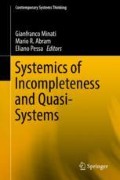Abstract
Understanding may be considered as being related to the availability of effective theories allowing for effective predictions and interventions. Formalisations of theories allow modelling and simulations. However, approaches such as connectionism, network science, sub-symbolism, and evidence-based methods, have accustomed us to accept and use approaches without full comprehensive formal explanations, such as for the ubiquitous phenomenon of emergence. We are increasingly accepting the use of concordances, redundancies, transversal properties (e.g., power laws and scale invariance), and simulation properties as clues to be confirmed, as for induction, by their high frequency occurrence. This may be considered to be related to the availability of enormous amounts of data in conceptually data-driven frameworks, where data driven means retrospective clustering. We discuss whether systemic understanding should be considered as ideal, formal understanding or concordance-based.
Access this chapter
Tax calculation will be finalised at checkout
Purchases are for personal use only
References
Anderson, C. (2008). The end of theory: The data deluge makes the scientific method obsolete. Wired Magazine, 16(7), 16–07.
Bazaluk, O. (2016). The theory of evolution. Newcastle: Cambridge Scholars Publishing.
Blackmore, S. (2013). Consciousness: An introduction. New York: Routledge.
Bunde, A., & Havlin, S. (2012). Fractals and disordered systems. New York: Springer.
Calude, C. S., & Longo, G. (2016). The deluge of spurious correlations in big data. Foundations of Science, 1–18. https://doi.org/10.1007/s10699-016-9489-4.
Estrada, E. (2016). The structure of complex networks: Theory and applications. Oxford: Oxford University Press.
Henshilwood, C. S., & Marean, C. W. (2003). The origin of modern human behavior: Critique of the models and their test implications. Current Anthropology, 44, 627–651.
Licata, I., & Minati, G. (2016). Emergence, computation and the freedom degree loss information principle in complex systems. Foundations of Science, 21(3), 1–19. http://link.springer.com/article/10.1007/s10699-016-9503-x.
Maturana, H. R., & Varela, F. J. (1992). The tree of knowledge: The biological roots of human understanding. Boston: Shamhala Publications.
Maxwell, N. (1998). The comprehensibility of the Universe: A new conception of science. New York: Oxford University Press.
McBrearty, S., & Brooks, A. (2000). The revolution that wasn’t: A new interpretation of the origin of modern humans. Journal of Human Evolution, 39, 453–563.
Minati, G. (2016a). Knowledge to manage the knowledge society: The concept of theoretical incompleteness. Systems, 4(3), 26. http://www.mdpi.com/2079-8954/4/3/26/pdf.
Minati, G. (2016b). General system(s) theory 2.0: A brief outline. In G. Minati, M. R. Abram & E. Pessa (Eds.), Towards a post-bertalanffy systemics (pp. 211–219). Cham: Springer.
Minati, G., & Licata, I. (2012). Meta-structural properties in collective behaviours. International Journal of General Systems, 41, 289–311.
Minati, G., & Licata, I. (2013). Emergence as mesoscopic coherence. Systems, 1(4), 50–65. http://www.mdpi.com/2079-8954/1/4/50.
Minati, G., & Licata, I. (2015). Meta-structures as multidynamics systems approach. Some introductory outlines. Journal on Systemics, Cybernetics and Informatics, 13(4), 35–38. http://www.iiisci.org/journal/sci/issue.asp?is=ISS1504.
Minati, G., & Pessa, E. (2018). From collective beings to quasi-systems. New York: Springer.
Peirce, C. S. (1998). Harvard lectures on pragmatism. In N. Houser, J. R. Eller, A. C. Lewis, A. De Tienne, C. L. Clark & D. B. Davis (Eds.), The essential Peirce: Selected philosophical writings, 1893–1913 (Chapters 10–16, pp. 133–241). Bloomington: Indiana University Press.
Ruelle, D. (2008). Chaotic evolution and attractors. Cambridge: Cambridge University Press.
Sagiroglu, S., & Sinanc, D. (2013). Big data: A review. In: 2013 International Conference on Collaboration Technologies and Systems (CTS) (pp. 42–47). IEEE Xplore Digital Library. Available at: https://www.researchgate.net/publication/261456895_Big_data_A_review.
Schroeder, M. (2009). Fractals, chaos, power laws: Minutes from an infinite paradise. New York: Dover.
Thorndike, E. K. (1921). The teacher’s world book. New York: Teachers College.
Von Foerster, H. (2003). Understanding understanding: Essays on cybernetics and cognition. New York: Springer.
Watzlawick, P., Weakland, J. H., & Fisch, R. (1974). Change-Principles of Problem Formation and Problem Resolution. New York: Norton.
Web Resources
Author information
Authors and Affiliations
Corresponding author
Editor information
Editors and Affiliations
Rights and permissions
Copyright information
© 2019 Springer Nature Switzerland AG
About this chapter
Cite this chapter
Minati, G. (2019). Does Systemics Still Need Theories? Theory-Less Knowledge?. In: Minati, G., Abram, M., Pessa, E. (eds) Systemics of Incompleteness and Quasi-Systems. Contemporary Systems Thinking. Springer, Cham. https://doi.org/10.1007/978-3-030-15277-2_5
Download citation
DOI: https://doi.org/10.1007/978-3-030-15277-2_5
Published:
Publisher Name: Springer, Cham
Print ISBN: 978-3-030-15276-5
Online ISBN: 978-3-030-15277-2
eBook Packages: Mathematics and StatisticsMathematics and Statistics (R0)

